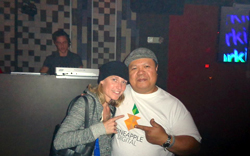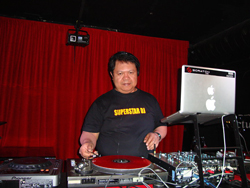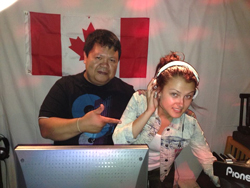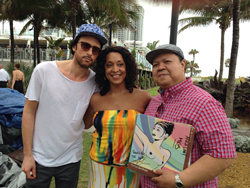ELECTROFANS:
Dave! What’s happening? Thanks for joining us today. So, let’s jump right in. You’ve just started your brand new label, Pineapple Digital, and already have a couple of cool new releases, with a hot one coming up from progressive house star, Dinka (a collab with Brazilian DJ/Producer Morttagua, out April 28th), as well as a very impressive initial following and interest, right out of the gates.
Tell us, why did you start Pineapple Digital, and what is your overall mission for the label? (if in fact, you have one)
Dave: I needed a big jumpstart as a new label, so having the Dinka & Morttagua release on my label was an essential. I always wanted to have my own label. I created this label out of a passion for good underground music.
 What do you think sets Pineapple apart from a lot of the other labels out there?
What do you think sets Pineapple apart from a lot of the other labels out there?
Dave: Me haha, I like so many types of electronic music so you will see a lot of different genres coming out of PD like progressive house/trance, deep, tech, funky, minimal, dub, breaks, chill out, down tempo, lounge. Things are run differently at Pineapple, we are all one big family, we involve the producers in every aspect of the business like day to day operations, etc.
 You’ve got a vast amount of experience and background in the music scene (over 30 years) as an award-winning DJ spinning in several cities worldwide, dance event promoter, playing piano and drums as a kid, and most recently as A&R Director at Nueva Digital… Tell us in your own words a little about some of your background with music, and a few milestones in your career.
You’ve got a vast amount of experience and background in the music scene (over 30 years) as an award-winning DJ spinning in several cities worldwide, dance event promoter, playing piano and drums as a kid, and most recently as A&R Director at Nueva Digital… Tell us in your own words a little about some of your background with music, and a few milestones in your career.
Dave: Growing up I was exposed to different kinds of music, classical, opera, rock, jazz, blues, contemporary pop, latin, brazilian, soul, and funk. My parents liked music a lot and at an early age they kinda’ urged me to take piano lessons and I picked up the drums thru my older siblings who played in a band and at church.
My older brothers used to sneak me into discotheques as early as 1975, I was a freshman at high school at the time and it was the first time I heard and saw a Spinner/ Disc Jockey play, and caught the Deejaying bug ever since. By 1976 I was spinning at local parties and in 1978 got my first gig at a local club and went professional in 1979. I went to semi-retirement in the 90’s as I was raising a family, then got back to it by the end of ’99 and have been playing on and off ever since.
I got into the promoting scene in the early 80’s it was like the early version of raves but we did not hold it in abandoned buildings and warehouses, we usually held it in basketball courts, pavilions or club houses so it was legit.
I tried my hand at remixing disco records as early as 1977, using cassette recorders and reel to reel and picked up the art of splicing tapes along the way. By 1979 I was doing live remixing by way of two identical records in my club gigs and did the first mashups back then.
One of the more recent projects I did for Nueva Digital, ‘Fragments Volume 1,’ a progressive breaks compilation, was a huge success as it stayed in the number 1 spot for 2 weeks in Beatport’s Top 100 Breaks releases and 3 of the tracks also charted in the Top 100 Breaks singles charts.
 You’ve DJ’ed in your native Toronto, NYC, Montreal, Europe, and Asia, what were a few of your most memorable experiences as an international DJ??
You’ve DJ’ed in your native Toronto, NYC, Montreal, Europe, and Asia, what were a few of your most memorable experiences as an international DJ??
Dave: Playing on my birthday at Palladium in Manila, they definitely gave me a real treat I could not forget on my big 5-0.
What was the wildest place/crowd you ever played for?
Dave: There was a few of them really. NYE gig at Great Dane, Wassau, Palladium, Manila, Nocturne,Toronto, Whimseys, Boston.
Speaking of live shows, you had the good fortune to catch the Max Graham set in March in Toronto, where he was celebrating Cycles Radio 150. That was a pretty kick-ass set. What was the vibe like there?
Dave: It was actually the second time I hung out back stage with Max, so me coming back for seconds means that Max throws down good sets, Mark Sherry dropped a wicked set as well that night and it was broadcasted and streamed live at DI.FM.
 You also made it to WMC (“Winter Music Conference”) in Miami too, right? Who/what did you get the chance to see and what were some of the highlights for you?
You also made it to WMC (“Winter Music Conference”) in Miami too, right? Who/what did you get the chance to see and what were some of the highlights for you?
Dave: Meeting Miguel Migs and Lisa Shaw, and having them autograph their records from my collection, is priceless! I went event hopping from Solarstone’s Pure Trance event, met Kristina Sky, Rich, Orkidea, and hooked up with Darin Epsilon on the adjacent club next door. I had a meeting with the program director for Sirius satellite radio for a future regular radio spot, crossing my fingers that I do get it.
Speaking of which, what are your thoughts overall on the way that the EDM scene has gotten so big these last few years or so… Do you think it’s a good thing/bad thing overall for the electronic music scene (especially related to progressive house music)?
Dave: EDM has gotten so big that it blurred the lines that once existed between pop and dance music, and EDM became a multi-billion dollar industry. A lot of progressive house producers benefited from this sudden boom, and started to make commercially sounding big room house tracks for monetary gain and that alienated their loyal followers. In a way it is bad for the genre as it is getting polluted with a lot of these big room house music labeled as progressive house, if you look at the Top 10 at Beatport and listen to all of them, they have one thing in common, they all sound very similar.
Back to your label, what are a few things in particular that you’d be looking for in the music of an original producer in order for you to want to sign them to Pineapple Digital?
Dave: We prefer productions that sound unique that do not use templates or sample packs. Originality and good vibes is the key here.
As most of us know, the reality in the music business is that it is typically pretty hard to achieve large-scale succcess (whether that be electronic, pop, rock or other types of music for that matter). What advice do you have for aspiring music producers who may be looking to get signed by a major label, or possibly get some good gigs?
Dave: There is no easy formula for this really but here a few pointers, but it all boils down to perseverance and hard work. Everyone usually starts from the bottom, you have to crawl before you can walk.
- Start small and move up the ladder, send your demos out to smaller labels first.
- Do your research on the label before you send your demo, do not send a demo that does not fit the label’s image and sound. (Sending a dub step demo to a progressive house label does not work out)
- Always send in your best track/s, labels prefer 1 track but 2 is okay.
- Be courteous and professional when you introduce yourself, provide relevant details. Have you released on other labels? Did you receive support from known artists?
- Do not send your demo as a work in progress (WIP) it must be a finished track. Do not send it as an email attachment, when labels see this they delete it.
- Send out individual emails to labels do not CC or BCC other labels as this is a big no no.
- Send in demos in MP3 format 320 kbps quality. It would help if you provide a streamable link with an option to download, make it as easy and convenient for labels as much as possible.
- Be patient and do not constantly follow up or bug the label with emails like have you listened to my demo? The average response rate is 7 days for a small label to 3 months for a big label.
- Everyday there are more and more producers coming out of the woodwork and all of them have the same intentions as everyone else. Try not to sound like everyone else, be unique. Your track has to standout.
- Don’t even think about getting gigs yet, polish up your production skills, while it is easier and quicker to hone your DJ’ing skills, producing takes time usually more than a year or more before your skills mature. It is a good idea to listen to tracks of producers that you fancy and analyze how they made their tracks and use it as your reference only and do not copy other producers’ styles. Have a chat with veteran producers and get some tips.
Last question, what do you think that electronic music FANS are especially looking for when they are checking out new releases or new producers for the first time?
Dave: It depends on the person really as to what genres he or she is interested in. I would say they would check out sites or blogs that people usually go to. What would come in to my mind as a fan myself? SoundCloud, Beatport, ITunes, YouTube, Band Camp a few bug EDM sites.
Dave, thanks a lot for sharing your thoughts in this interview, and good luck with the label!
Dave: Thank you very much and more power to Electrofans!
MORE ABOUT PINEAPPLE DIGITAL:
http://www.pineappledigitalmusic.com/
https://soundcloud.com/pineappledigital/
https://www.facebook.com/PineappleDigital
To send your demos:
demos@pineappledigitalmusic.com
We’ll also keep you updated on Pineapple Digital news & new releases on Electrofans.com, so please be sure to check our upcoming previews and new releases sections of the site for the latest news and info.
Stay tuned for more cool & fresh tunes from Pineapple in the future, you can be sure of that!!

 - our new professional network
- our new professional network







